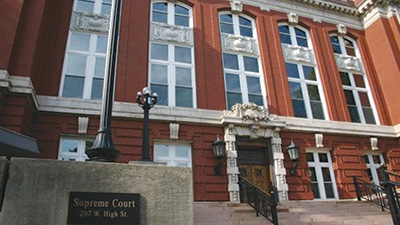
Jefferson City — A Republican attempt to change Missouri’s public sector union rules is “rigged” against rank-and-file workers, a labor attorney told the state’s Supreme Court recently.
Attorney Jason Walta, representing teachers and thousands of state employees, said the 2018 law creates “Draconian restrictions on collective bargaining… applied in a discriminatory manner.”
The measure, signed by former Republican Gov. Eric Greitens, mirrors the U.S. Supreme Court’s Janus decision requiring teachers and all other unionized government employers – other than first-responders and law enforcement officers – to annually opt-in for the union to deduct dues or other fees from paychecks or to spend money on political causes.
RECERTIFICATION AND COLLECTIVE BARGAINING
In addition, the bill requires recertification votes for most public-sector unions to continue their representation of workers. Under that provision, unions can only prevail by receiving not simply a majority of the votes cast, but a majority of all eligible employees whether or not they voted. Under that provision, non-votes would be treated as “no” votes, unfairly tipping the scales against the union.
Another provision limits the topics on which public-sector unions can bargain.
UNCONSTITUTIONAL
Seven unions representing teachers, patient care professionals, maintenance workers and public safety employees filed suit saying the bill violates the Missouri Constitution by constraining free speech of most public-sector unions and giving preferential treatment to others.
The bill, which initially took effect in August 2018, was placed on hold while the case worked its way through the courts.
In January, St. Louis County Judge Joseph Walsh ruled that most of the so-called “paycheck protection bill” was unconstitutional.
The bill’s sponsor, Rep. Jered Taylor (R-Nixa) had argued his legislation would “hold unions accountable to members,” but Walsh sided with the unions that contend the law places “discriminatory burdens” on non-public safety unions and infringes upon political speech.
Since taking over as governor, Republican Mike Parson’s administration hasn’t renewed any of the labor agreements with state employees, many of whom are on the frontlines of the pandemic, and who rank as the lowest paid in the nation.
WORSENING THE PAY GAP
The non-partisan Economic Policy Institute (EPI) filed a friend of the court (“amicus”) brief in the case, noting that weakening collective bargaining rights for public sector workers will worsen the pay gap women and workers of color face when their wages are compared to those of white men. Wisconsin went from having no wage gap to having a significant wage gap after state legislators and then-governor Scott Walker weakened the state’s public sector collective bargaining law, EPI explained.
Weakening collective bargaining rights deprives workers of due process and a proven means for challenging arbitrary or discriminatory treatment, EPI said.
The Supreme Court did not set a date to reach a decision in the case.


